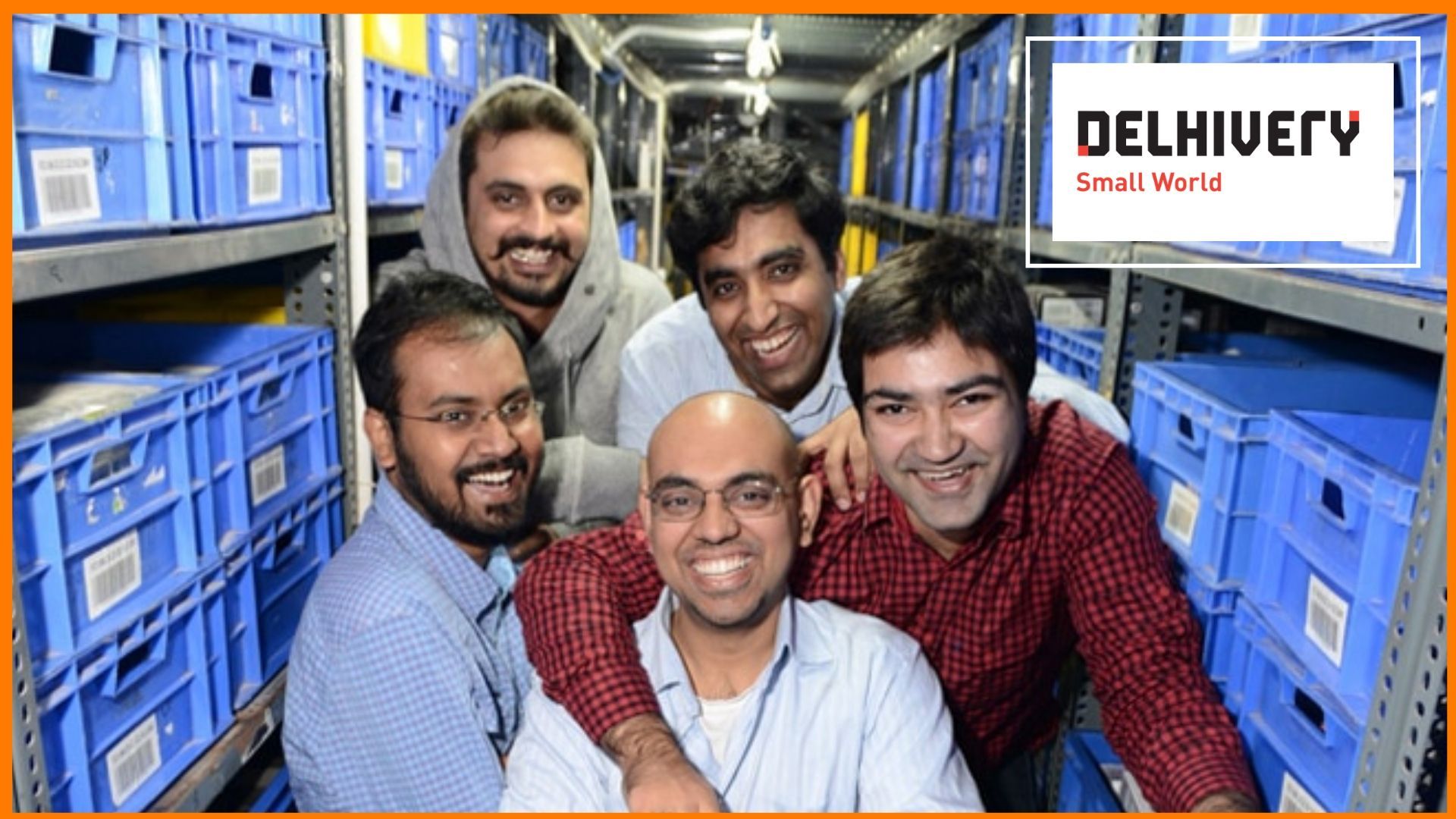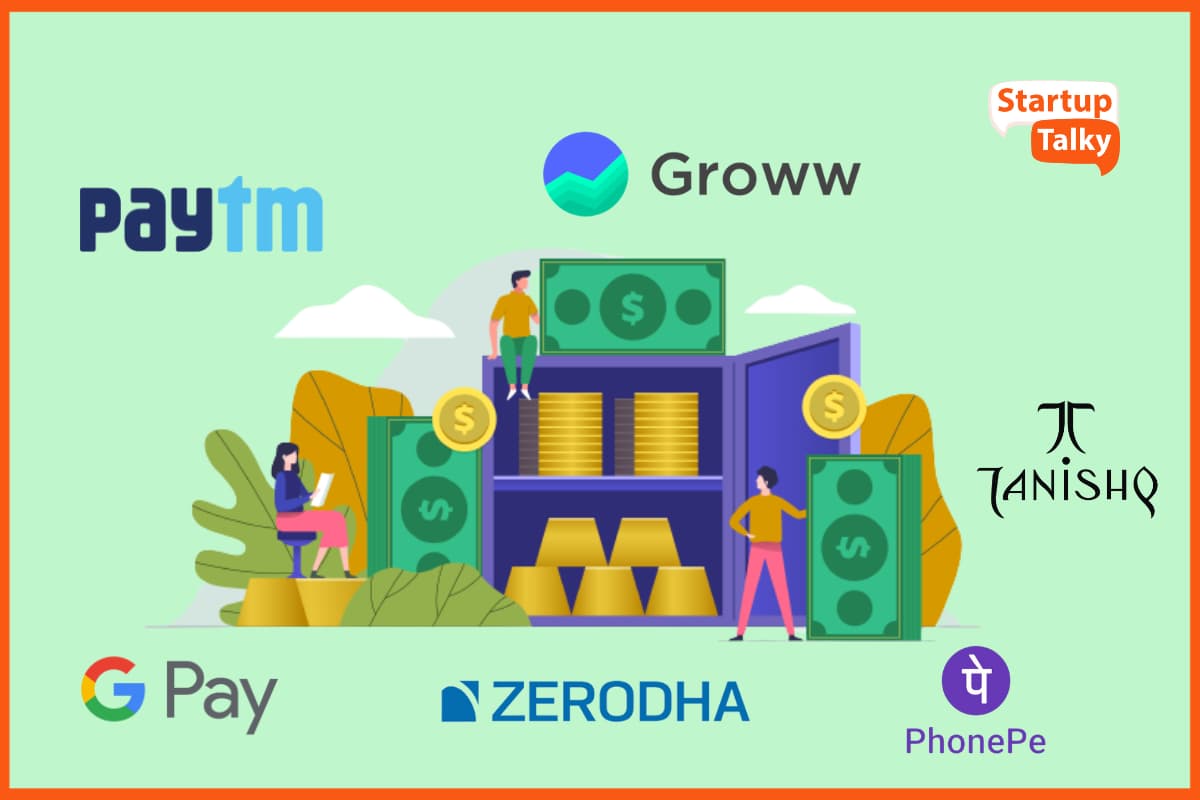Collection and Distribution are the two main aspects of trade and commerce. Especially these days when eCommerce is booming, logistics has gained renewed importance. As per a report, the eCommerce retail logistics market was valued at USD 224.51 billion in 2021 and is expected to grow by $388.63 billion by 2030. To tap this growing demand, four ex-Blue Dart employees started up Ecom Express in 2012. Today Ecom Express offers nationwide express delivery services to the eCommerce industry.
The Indian logistics sector is undergoing significant consolidation, with Delhivery Limited announcing its acquisition of a 99.4% controlling stake in Ecom Express Limited for up to INR 1,407 crore ($169.5 million) in an all-cash deal. This acquisition, approved during a Delhivery board meeting on Thursday, April 5, represents one of the largest transactions in the logistics industry. Let’s explore more about the journey and accomplishments of this startup that has established itself as one of the best delivery services in the country, now acquired by Delhivery.
Here’s more about the Ecom Express Company, Ecomexpress Tracking, Owners, Ecom Express Pvt. Ltd. Founders, history, Startup Story, Logo and Tagline, Vision and Mission, Growth, Competitors, Business Model, Revenue Model, Funding and Investors, and more.
Ecom Express – Company Highlights
| Company Name | Ecom Express |
|---|---|
| Headquarter | Gurugram |
| Founders | T.A.Krishnan, K.Satyanarayana, Manju Dhawan & Late Sanjeev Saxena |
| Sector | Logistics |
| Founded | 2012 |
| Acquired by | Delhivery |
| Website | ecomexpress.in |
Ecom Express – About
Ecom Express – Industry
Ecom Express – Startup Story
Ecom Express – USPs
Ecom Express – Founders and Team
Ecom Express – Mission and Vision
Ecom Express – Name, Tagline and Logo
Ecom Express – Product And Service
Ecom Express – Business Model and Revenue Model
Ecom Express – Growth
Ecom Express – Financials
Ecom Express – Funding and Investors
Ecom Express – Shareholding
Ecom Express – IPO
Ecom Express – ESOPs
Ecom Express – Investments
Ecom Express – Challenges
Ecom Express – Awards
Ecom Express – Competitors
Ecom Express – Future Plans
Ecom Express – About
Ecom Express is a leading logistics service provider in the country, which was started in the year 2012. The company offers a variety of facilities, such as express services, digital services, and fulfillment services.
The Express services include ‘Ecom Express Service’ and ‘Ecom Ground Service’. Ecom Express Service renders pick-up (from sellers or warehouses) and delivery of products (to end customers) that are ordered online. While Ecom Ground Service is specifically designed for transporting huge and bulky products, they use inbuilt automated systems for tracking end-to-end orders. Under the Express service, Ecom Express also ensures QC (quality check) -enabled reverse logistics facilities, whereby trained Ecom Express executives perform quality checks of the products being returned by the end customers and deliver them safely to the sellers or to the warehouse from where the product was dispatched.
Ecom Digital Services offers e-KYC-Aadhar-based biometric verification and industry-specific cash, cheque, and document collection and Contact Point Verification (CPV) services
Under Ecom fulfillment services, Ecom Express offers warehousing and order management services. As for warehousing, the clients can choose the location of the warehouse and the space required per their requirements.
The company was recently acquired by Delhivery in April 2025 for INR 1407 crores in an all-cash deal.
With Delhivery Limited announcing its acquisition of a 99.4% controlling stake in Ecom Express Limited for up to ₹1,407 crore ($169.5 million) in an all-cash deal, Ecom Express is now fully acquired by Delhivery. This acquisition, approved during a Delhivery board meeting on Thursday, April 5, represents one of the largest transactions in the logistics industry.
For Ecom Express, this appears to be a distressed sale, as the company had last raised private equity at a valuation of approximately INR 7,300 crore. The acquisition price suggests a sharp decline in valuation, down by about 78% since its most recent funding round. Ecom Express has faced multiple challenges, including scrapping its plans to go public this year and dealing with controversial layoffs earlier.
Ecom Express – Industry
The India eCommerce logistics market is projected to experience significant growth over the next several years. In 2024, the market size is estimated to be USD 3.98 billion. By 2029, it is expected to nearly double, reaching USD 7.24 billion. This expansion represents a compound annual growth rate (CAGR) of 12.72% during the forecast period from 2024 to 2029. The growth is driven by the increasing demand for efficient delivery services as e-commerce continues to expand across India.
Ecom Express – Startup Story
Ecom Express was set up by four ex-Blue Dart employees, who collectively had an experience of more than 25 years in the logistics sector. It was way back in 2012 when the markets weren’t as good as they are now, and the eCommerce business was just gearing up for next-level growth. Furthermore, the logistics service wasn’t also as good as it appears today. As per the startup story of Ecom Express, 4 Blue Dart Express business professionals – Sanjeev Saxena, Manju Dhawan, K. Satyanarayana, and T.A. Krishnan sat for dinner, and when they left the table, they were full of the idea of their new logistics startup, which would eventually be named Ecom Express. The experience that the Blue Dart Express employees bore helped them gear forth with the idea that the B2C segment of the market would need their help, which is why they proceeded with a B2B business. The Ecom Express company was incorporated in August 2012, and its business operations started from January 2013 onwards.
Ecom Express – USP
Ecom Express stands ahead of other logistics services with its distinctive qualities. It serves in more than 2400 towns and cities in India, with a secured and reliable shipment of products with GPS-enabled vehicles. With its fleet network operating in 150 long-haul runs and 480 short-haul runs, it covers almost 80% of the total orders via its own network. Ecom Express’ order fulfillment services use cutting-edge technology to ensure controlled movements of orders and ensure point-to-point validation, thus making it a transparent process. Besides, through features like efficient route optimization, real-time electronic proof of delivery, cash-on-delivery collection, and real-time order tracking facilities, Ecom Express provides a seamless experience to both the end customers and the consignees.
[https://www.itln.in/pharma-logistics-explosive-growth-on-the-anvil/] have shown
that over 65% of India’s cargo is being carried on trucks. With exploding
domestic consumption rates in the country, improvement and extensi…

Ecom Express – Founders and Team
When Ecom Express was started in 2012, the eCommerce sector was not as popular as it is today. However, with the years of experience they have, the Ecom Express founders could gauge the growth that the logistics sector will see with the eCommerce revolution, and it is this vision that inspired them to start up.

Ecom Express was founded by T.A Krishnan, K. Satyanarayana, Manju Dhawan, and Late Sanjeev Saxena.
T.A Krishnan
Mr. T.A Krishnan has an MBA and has worked as the VP North and Senior Vice President North and All India Head of Ecommerce Vehicle at Blue Dart Express, after which he left the company to found Ecom Express, where he was known as the Co-founder and CEO. He previously served the role of the Chief Operating Officer with Ecom Express. Krishnan had over 28 years of experience when he founded Ecom Express, making his professional experience over 37 years.
K. Satyanarayana
Mr. K Satyanarayana is an acknowledged leader in the Indian Express and logistics industry, with more than 26 years of experience in delivery services. Satyanarayana worked as a Regional Controller of the North Division with Blue Dart Express and had been with the company for 26 long years, after which he quit his job and co-founded Ecom Express. Satyanarayana is currently serving as a Co-founder and Director at Ecom Express.
Manju Dhawan
With her innovative perceptions of the market trends and client-centric strategies along with 25 years of practice, Manju Dhawan leads the company with functional excellence. Manju had over 24 years of experience with Blue Dart, where she had served as the Head of Customer Care after which she decided to co-found Ecom Express where she currently is the Co-founder and the Head of Customer Care.
Late Sanjeev Saxena
Sanjeev Saxena was another Co-founder of Ecom Express and was known for his entrepreneurial insight and visionary approach. Saxena died in 2020 and has been remembered for the strategic and operational direction that he brought into the company, which resulted in the overall growth of Ecomm Express.
The company has a team of directors and executive management with more than 19000 employees.
Ecom Express – Mission and Vision
The company aims to make ecommerce shipping easy. “Providing end-to-end technology-enabled logistics solutions to small and large eCommerce players” is the mission and vision of the company.
Ecom Express – Name, Tagline and Logo
“We Offer Possibilities In Every Direction,” – goes the tagline of Ecom Express. “We Make E-commerce Shipping Easy,” says the company on its website, where we can see another tagline, “Simple Solutions. High Impact.”

The name ‘Ecom Express’ portrays the collection and distribution services offered by the company in the e-commerce industry.
Ecom Express – Product And Service
WMS & OMS
Ecom Magnum, a service for sellers, was introduced by Ecom Express as the Warehouse Management Solutions (WMS) and Order Management Solutions (OMS) on February, 9, 2023.
Same Day Delivery, Same Day Delivery+, and Next Day Delivery
To meet the increasing needs of Indian eCommerce firms, Ecom Express Limited, a leading provider of end-to-end technology-enabled logistics solutions, announced the debut of three new services: Same Day Delivery (SDD), Same Day Delivery+ (SDD+), and Next Day Delivery (NDD) on April 21, 2023. By providing quicker and more dependable deliveries, Ecom Express hopes to enhance the customer experience and grow its clientele with the introduction of these services.
Ecom Express – Business Model and Revenue Model
Ecom Express operates in a B2B business model and offers its services to eCommerce companies. With its digital services, Ecom Express also provides services to companies from the Banking, Insurance, and Financial sectors. Ecom Express’s clientele includes market leaders such as Amazon, Flipkart, Clovia, Myntra, Paytm, Nykaa, and more.
Ecom Express gains a major portion of its revenues from the deliveries it makes and its related commissions.
Ecom Expres – Growth
Ecom Express started its operations in 35 cities with 42 delivery centers and around 300 employees. The company eventually saw its expansion to Kashmir because of the traction it achieved by July 2013, and gradually it again saw quite a customer demand in Mumbai, Delhi, and Surat and rapidly extended its operations primarily to these cities and then to the others. Now, it has 50000+ employees, 3,000+ delivery branches in 2,700+ different cities with 8,00,000 shipments/day.
Starting in 2012, Ecom Express has certainly achieved numerous milestones in growth. Some of the major growth highlights of the brand are:
- Ecom Express extends its logistics services to over 2,700+ towns
- The company is presently servicing 27,000+ pin codes
- Ecom Express boasts of employing over 50,000+ people
- The Krishnan-led company has over 3,000 facility centers
Ecom Express – Financials
Ecom Express Financials
Ecom Express has seen steady revenue growth over the last five years. However, the company continues to face profitability challenges, with losses in both FY24 and FY23 despite cost-control efforts.
| Particulars | FY24 | FY23 | FY22 | FY21 | FY20 |
|---|---|---|---|---|---|
| Revenue | INR 2,652.9 crore | INR 2,575.5 crore | INR 2,162.1 crore | INR 1,667.1 crore | INR 1,253.9 crore |
| Expenses | INR 2,921.6 crore | INR 2,902.8 crore | INR 2,269.4 crore | INR 1,613.6 crore | INR 1,631.4 crore |
| Profit/(Loss) | (INR 248.5 crore) | (INR 359.9 crore) | (INR 91.4 crore) | INR 43.4 crore | (INR 313.5 crore) |
In FY24, Ecom Express increased its revenue by INR 77.4 crore, while losses reduced from INR 359.9 crore to INR 248.5 crore, showing signs of improved financial control.

Ecom Express Revenue:
| Revenue Type | FY24 | FY23 |
|---|---|---|
| Revenue from Operations | INR 2,607.3 crore | INR 2,548.2 crore |
| Other Income | INR 45.6 crore | INR 27.4 crore |
| Total Revenue | INR 2,652.9 crore | INR 2,575.5 crore |
Revenue grew by INR 77.4 crore in FY24, mainly driven by a jump in other income, which rose INR 18.2 crore, and a modest rise in core operations.
Ecom Express Profit/Loss:
| Metric | FY24 | FY23 |
|---|---|---|
| Gross Profit (approx) | (INR 268.7 crore) | (INR 327.3 crore) |
| Operating Profit | — | — |
| Net Profit/(Loss) | (INR 248.5 crore) | (INR 359.9 crore) |
Net loss reduced by INR 111.4 crore in FY24 compared to FY23, signaling improvement, though profitability remains elusive.
Ecom Express Expenses:
| Expense Type | FY24 | FY23 |
|---|---|---|
| Cost of Materials Consumed | INR 1,389.9 crore | INR 1,386.7 crore |
| Employee Benefit Expense | INR 603.3 crore | INR 664.0 crore |
| Finance Costs | INR 86.0 crore | INR 87.6 crore |
| Amortization & Depreciation | INR 221.6 crore | INR 211.6 crore |
| Other Expenses | INR 620.8 crore | INR 552.8 crore |
| Total Expenses | INR 2,921.6 crore | INR 2,902.8 crore |
Expenses increased slightly by INR 18.8 crore in FY24. “Other expenses” rose by INR 68 crore, while employee costs decreased by INR 60.7 crore, partially offsetting the increase.
Quick Summary (FY24 vs FY23):
- Revenue Growth: Up by INR 77.4 crore (3%), led by higher other income.
- Expense Management: Marginal rise in expenses a notable cut in employee costs by INR 60.7 crore.
- Profitability: The Net loss narrowed by INR 111.4 crore, but profitability remains a challenge.
- Business Implication: The company is making progress toward cost efficiency but needs sustained revenue momentum and loss reduction for profitability.
Ecom Express – Funding and Investors
Ecom Express has mopped up a total of $524.4 million in funding over the 6 funding rounds it has witnessed, which includes its latest funding of $14.7 million that came from the Warburg Pincus and British International Investment in July 2023. The Warburg Pincus-backed firm was last valued at $760 mn in August 2022.
Here’s a look at the Ecom Express funding rounds to date:
| Date | Stage | Amount | Investors |
|---|---|---|---|
| July 5, 2023 | Series C | $14.7 million | Warburg Pincus, British International Investment |
| October 6, 2022 | Venture Round | $39 million | Partners Group |
| March 9, 2021 | Venture Round | $20 million | CDC Group |
| December 16, 2020 | Private Equity Round | $250 miilion | Partners Group |
| December 10, 2019 | Venture Round | $36 million | CDC Group |
| September 11, 2017 | Private Equity Round | $25.38 million | Warburg Pincus |
| June 4, 2015 | Private Equity Round | $113.56 million | Warburg Pincus |
| September 9, 2014 | Venture Round | $13.36 million | Peepul Capital |
Ecom Express – Shareholding
Ecom Express’ shareholding pattern as of January 2025, sourced from Tracxn:
| Shareholders | Percentage |
|---|---|
| Kotla Sridevi | 2.8% |
| Manju Dhawan | 1.6% |
| Jayanti Krishnan | 1.1% |
| Saheba Saxena | 0.4% |
| T A Krishnan | < 0.1% |
| K Satyanarayana | < 0.1% |
| Warburg Pincus | 35.1% |
| British International Investment | 8.3% |
| CDC Group | 2.5% |
| Valli Alagappan Trust | – |
| GEPL Capital | – |
| Peepul Capital | – |
| Parent Entity | 36.7% |
| Boxman | – |
| Inland Financial services | – |
| Angel | 0.4% |
| Other People | 3.2% |
| ESOP Pool | 4.0% |
| Other Investors | 3.7% |
| Total | 100.0% |

Ecom Express – IPO
Ecom Express has filed for an IPO to raise up to INR 2,600 crore on August 15 2024 ($310 million). The IPO will include a fresh issue of shares worth INR 1,285 crore, with existing investors selling shares worth INR 1,316 crore. Ecom Express plans to use the funds from the fresh issue to build new processing and fulfilment centers, invest in IT equipment, and repay debt.
TA Krishnan, Kotla Satyanarayanan, and Manju Dhawan, the founders of the company have invested INR 3.63 crore each to increase their stakes in the company, as per a separate filing of the company.
Ecom Express – ESOPs
Ecom Express has adopted a new employee stock option scheme, ECOM ESOP SCHEME 2022. This ESOP scheme of the company consolidates the old ESOP plan from 2017 into the new pool, as per the separate regulatory filings of the company.
This new ESOP plan contains 126,000 stock options, each convertible to one equity share. The Ecom Express ESOP plan is estimated to be worth somewhere around Rs 115 crore.
Ecom Express – Investments
Ecom Express has invested on two occasions in the Bangladesh-based logistics firm Paperfly. While the former investment was in January 2021, the latter one was announced on April 19, 2022, when it invested Rs 34.3 crore in the company, marking the second investment.
| Name of the Company | Investment Date | Investment Amount | Lead Investor | Funding Round |
|---|---|---|---|---|
| Paperfly | April 19, 2022 | $4.48 mn | Yes | – |
| Paperfly | January 13, 2021 | $11.8 mn | Yes | Corporate Round |
Ecom Express – Challenges
One of the main challenges that Ecom Express has faced since it was founded is raising funds. The problem was later solved with Mohit from Oliphans, who pumped in the money, which was then followed by the founders, who also contributed to the overall funding of the company from their personal funds. Ecom Express finally managed to raise funds from its Series A funding round when Peepul Capital led a funding round worth Rs 100 crore. The other challenges of Ecom Express include managing a healthy network of delivery partners and clients, monitoring its overall performance, and lifting it up!
Ecom Express – Awards
2017
- Excellent Position Under E-commerce Logistics – CII Scale Awards
- Best E-commerce Logistics Partner – ISCM LSP Awards
- Most Disruptive Startup Logistics Idea, Supply Chain Disruptor of the Year – The 11th Express Logistics and Supply Chain Leadership Awards
- BW Disruptors Awards
- SCM and Logistics – Entrepreneur India Awards
- Best Cloud Implementation – BW CIO Imperatives
- Women Supply Chain Icon of the Year – The Global Logistics Excellence Awards
- The Enterprise IT World Awards
- Transport and Logistics Icon – 3rd Edition of the CIO Power List
- Appreciation for Expert Panel Evaluation – BML Munjal Awards
- Innovative CIOS Awards
2018
- Exemplary Women Leadership Award – The 12thExpress Logistics and Supply Chain Leadership Awards.
- Ecommerce Logistics – CII Scale Awards
- Fastest Setting up of Delivery centers in India by a logistics company – LIMCA Book of Records.
- SCM and Logistics – Entrepreneur India Awards
- Last Mile Partner of the year, Supply Chain CIO of the year- The Global Logistics Excellence Awards
2019
- Strategic Finance Transformation Icon – CFO Power List
- CIO 500 Award
- Fastest Growing Logistics Company of the year – Indian Oil Logistics Excellence Awards

Ecom Express – Competitors
The top competitors of Ecom Express are:
- Ekart Logistics
- Delhivery
- Xpressbees
- Shadowfax
Ecom Express – Future Plans
Ecom Express company plans to hire around 15,000 employees in the next two years. With its presence not limited to just big cities and towns but to many tier II, III, and IV cities and also hinterlands, Ecom Express aims to be the best benefactor and solutions provider for logistics services in the eCommerce industry. With collective values of Integrity, Commitment, Openness, Respect, and Passion, the Ecom Express’ mission is to be paramount in the industry.
India’s eCommerce logistics market is growing quickly, fueled by the increasing demand for fast and efficient delivery services. Major investments in infrastructure and technology are reshaping the operations of logistics companies. Ecom Express’s IPO is more than just a fundraising effort; it’s a strategic move to better position the company to meet the rising demands of the market. If successful, this could set a benchmark in the logistics industry, attracting more capital and driving further technological advancements.
Ecom Express has already converted into a public entity in January when the board has approved a fundraise of about $648 million (INR 4,860 crore) via a public issue of shares.
on different startups and organizations. The content in this post has been
approved by the organization it is based on. Don’t you think online buying and selling has become an essential part of our
lives? Youth and adu…

Conclusion
The leading logistics solutions provider that provides end-to-end with a focus on speed, safe, and reliable nationwide express delivery services to the eCommerce industry. Ecom Express has been operational since its inception and the company has not made IPO claims till now. The company is fully functional without any obstacles and is leading the delivery market with flying colors. The company is planning to upscale its business by opening new branches in new towns and cities.
FAQs
How long does ECOM Express take to deliver?
Ecom Express offers timely cash-on-delivery (COD) remittances and guaranteed last-mile delivery of the orders in India within 24 to 72 hours, all around the year, including Sundays/Holidays.
How do I track my ECOM parcel?
You can simply open Ecom Express official site and paste your Ecom Express airway bill number or the Ecom Express tracking order number and click on “TRACK MY ORDER”. Then, you can enter the Ecom Express tracking number and click “track” on top of this page to track your order and Ecom Express delivery, shipping, and shipway.
What is Ecom Express owner name?
Ecom Express was founded by Late Sanjeev Saxena, Manju Dhawan, K. Satyanarayana, T.A Krishnan.
Is Ecom Express owned by Flipkart?
No, Ecom Express is not owned by Flipkart. Ecom Express is an independent logistics company in India that specializes in e-commerce logistics. While it serves various eCommerce platforms, including Flipkart, it is not owned by any of them.
What is Ecom Express and how does Ecom Express work?
Ecom Express uses its cutting-edge technology and automation solutions to enable first-mile pickup, processing, network optimization, and last-mile delivery. Ecom Express has its presence in all 29 states of the country and operates in over 2,700 cities and towns across 27,000+ PIN codes in India.
How do I return an item to Ecom Express?
You can follow these easy steps if you want to return an item to Ecom Express:
- Go to the ‘Orders’ tab in the left menu.
- Now, click on ‘All Orders’
- For all shipments that have been marked as ‘Delivered’, you will automatically find a ‘Create Return’ option.
- Click on ‘Create Return’
- A new page with prefilled details about your order will open.
How do I complain to Ecom Express?
Ecom Express customer support has been notified about the posted complaint. Request you to kindly provide the 9 or 10-digit AWB / tracking number for us to assist you on the same.
Ecom Express started in which year?
Ecom Express was started in 2012.

































































